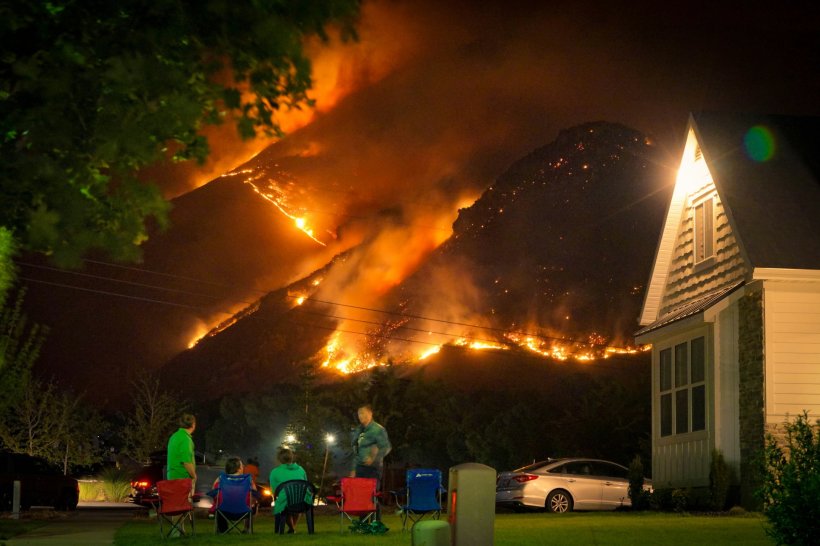
© Mike Newbry – unsplash.com
News • Health effects of global warming reach new heights
Climate change: The million-life, trillion-dollar health crisis
As health threats from climate change reach unprecedented levels and political backsliding on climate action threatens to stall progress, the 2025 Report of The Lancet Countdown on Health and Climate Change issues a fresh clarion call for “all hands on deck” to accelerate and intensify efforts to simultaneously reduce greenhouse gas emissions (GHG) and adapt to climate change.
The 2025 report can be accessed here.
“This year’s health stocktake paints a bleak and undeniable picture of the devastating health harms reaching all corners of the world – with record-breaking threats to health from heat, extreme weather events, and wildfire smoke killing millions. The destruction to lives and livelihoods will continue to escalate until we end our fossil fuel addiction and dramatically up our game to adapt,” warned Dr Marina Romanello, Executive Director of the Lancet Countdown at University College London.
She added, “We already have the solutions at hand to avoid a climate catastrophe – and communities and local governments around the world are proving that progress is possible. From clean energy growth to city adaptation, action is underway and delivering real health benefits – but we must keep up the momentum. Rapidly phasing out fossil fuels remains the most powerful lever to slow climate change and protect lives. At the same time, shifting to healthier, climate-friendly diets and more sustainable agricultural systems would massively cut pollution, greenhouse gases and deforestation, potentially saving over ten million lives a year."
Recommended article

Article • Collection
Focus on environmental medicine
Harmful substances in the soil, water and air also endanger people's health. In recent years, environmental medicine has been increasingly concerned with the consequences of climate change.
The 9th Lancet Countdown annual indicator report, led by University College London, and produced in collaboration with the World Health Organization (WHO), represents the work of 128 leading experts from 71 academic institutions and UN agencies globally. Published ahead of the 30th UN Conference of the Parties (COP), the report provides the most comprehensive assessment to date of the connections between climate change and health, including new metrics which record deaths from extreme heat and wildfire smoke, the coverage of urban blue spaces (rivers, lakes, and coastlines), health adaptation funding and individual engagement with health and climate change.
Record-breaking health toll of the persistent over reliance on fossil fuels and adaptation delays
The year 2024 was the hottest on record, with catastrophic consequences for the health, lives, and livelihoods of people across the globe, says the report. Worldwide, the average person was exposed to a record extra 16 health-threatening hot days owing directly to climate change, with the most vulnerable (those aged under 1 year and over 65 years) experiencing, on average, an all-time high of 20 heatwave days—a 389% and 304% increase, respectively, from the 1986–2005 yearly average.
Around the world we are seeing these multiple health impacts compound each other to trigger a cascade of harms that undermine the very social and economic foundations that support people’s health and wellbeing
Stella Hartinger
In parallel, a new indicator in this year’s report reveals that heat-related mortality per 100,000 increased by 23% since the 1990s, with total heat-related deaths reaching an average of 546,000 annually between 2012 and 2021. Hotter and dryer conditions have also fuelled conditions for wildfires, with fine particle pollution (PM2.5) from wildfire smoke resulting in a record 154,000 deaths in 2024 (up 36% from the 2003–2012 yearly average), while droughts and heatwaves increased the number of people experiencing moderate or severe food insecurity by 123 million in 2023, compared to the annual average between 1981 and 2010.
Added to this, delays in the adoption of clean, climate-friendly energy means over 2 billion people still use polluting and unreliable fuels in their homes. Across 65 countries with low access to clean energy, air pollution from the household use of dirty fuels resulted in 2.3 million avoidable deaths in 2022; including some of the 2.52 million deaths still attributable to ambient air pollution from the burning of fossil fuels globally. Unsustainable food systems are also fuelling climate change, and high-carbon, unhealthy diets contributed to 11.8 million diet-related deaths in 2022, which could largely be avoided by transitioning to healthier, climate-friendly food systems.
More broadly, the report highlights climate change is increasingly destroying livelihoods, straining the economy, and burdening health budgets. Heat exposure resulted in a record 639 billion potential hours of lost labour productivity in 2024, with income losses equivalent to a staggering US$ 1.09 trillion (almost 1% of global GDP). At the same time, the costs of heat-related deaths in those over age 65 reached an all-time high of US$ 261 billion.
In response to soaring fossil fuel prices, and with outdated energy grids overly reliant on them, governments around the world poured US$ 956 billion into net fossil fuel subsidies in 2023 to keep energy locally affordable – increasing fiscal pressures and dwarfing the $300 billion a year committed to support the most climate-vulnerable countries made at COP29. Concerningly, 15 out of 87 countries responsible for 93% of global CO2 emissions spent more on net fossil fuel subsidies than their national health budgets in 2023. As Dr Romanello explained, “The increased affordability and accessibility of clean renewable energy presents an opportunity to increase local energy generation, reduce the health harms of fossil fuels, and support the redirection of fossil fuel subsidies towards promoting a healthier future.”
Also published is the 2025 Latin America Report of the Lancet Countdown, which also identifies an alarming intensification and confluence of climate hazards. Professor Stella Hartinger, Director of the Lancet Countdown Latin America and global report author, said, “Around the world we are seeing these multiple health impacts compound each other to trigger a cascade of harms that undermine the very social and economic foundations that support people’s health and wellbeing. After nine years of global monitoring, it’s clear that these health harms are the price we are paying for the consistent failure of global leaders to deliver the action needed to combat climate change and protect health – a price paid most severely by vulnerable countries that have contributed the least to the crisis.”
Authors say delays in adaptation are exacerbating the health harms of climate change. “Scarce financial support for adaptation remains a key barrier, and data in this report shows it is still grossly insufficient to cover the financial needs disclosed by countries,” said Dr Romanello. “A political shift towards reduced foreign aid support from some of the world’s wealthiest countries, further restricts financial support for climate change action, leaving all populations increasingly unprotected.”
Seizing the global momentum for health-promoting climate action
While some national governments roll back on climate commitments, the report outlines that local governments, individuals, civil society, and the health sector are leading the way in shaping a healthier future, signalling what could be the start of transformative climate action. A growing number of cities (834 of 858 reporting in 2024) have completed or intend to complete climate change risk assessments, according to the CDP (the world’s largest voluntary reporting system on climate change progress). The health sector itself has shown impressive climate leadership, with health-related GHG emissions falling 16% globally between 2021 and 2022, and almost two-thirds of medical students around the world received climate and health education in 2024, building capacity for further progress.
Climate change action remains one of the greatest health opportunities of the 21st century
Tafadzwa Mahbhaudi
According to the report, the global momentum for climate change action is already delivering associated health and economic benefits. An increased shift away from coal, particularly in wealthy countries, prevented an estimated 160,000 premature deaths yearly between 2010 and 2022, due to fine particulate (PM2.5) air pollution from burning fossil fuels. The share of electricity generated by modern renewables reached a record-high 12% in 2022, with the clean energy transition generating healthier, more sustainable jobs. Globally, over 16 million people worked directly or indirectly in renewables in 2023 (up 18.3% from 2022).
As Professor Tafadzwa Mahbhaudi, Director of the Lancet Countdown Africa explained, “Climate change action remains one of the greatest health opportunities of the 21st century, also driving development, spurring innovation, creating jobs, and reducing energy poverty. Realising the myriad benefits of a health-centred response requires unlocking so-far untapped opportunities to mitigate climate change and build resilience to the impacts already being felt.”
As Professor Anthony Costello, Co-Chair of the Lancet Countdown warned, “As a rising number of world leaders threaten to reverse the little progress to date, urgent efforts are needed at every level and in every sector to both deliver and demand accelerated action that will yield immediate health benefits. As some governments uphold an unsustainable, unhealthy and ultimately unliveable status quo, people around the world are paying the ultimate price. We have to build on the momentum we have seen from local action: Delivering health-protective, equitable, and just transition requires all hands on deck.”
Source: The Lancet
30.10.2025






